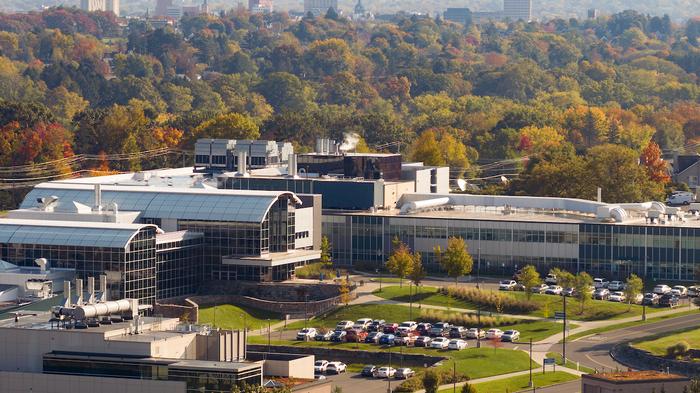BINGHAMTON, N.Y. — A Binghamton University team is one of just 18 nationally that will share in $100 million in U.S. National Science Foundation (NSF) funding from the Technology, Innovation and Partnerships (TIP) Directorate to accelerate the pace and scale of translational research.

Credit: Binghamton University, State University of New York
BINGHAMTON, N.Y. — A Binghamton University team is one of just 18 nationally that will share in $100 million in U.S. National Science Foundation (NSF) funding from the Technology, Innovation and Partnerships (TIP) Directorate to accelerate the pace and scale of translational research.
The Accelerating Research Translation (ART) program will provide $6 million to Binghamton as a cooperative agreement over four years to source and grow pivotal innovations that, with help from the technology transfer office, can go to market and have a positive impact on society.
“Binghamton is quickly becoming a national hub for innovation, and the NSF’s latest $6 million ART investment only builds on that momentum – amplifying the reach of Binghamton University’s cutting-edge research while supporting the education and training of New York’s future entrepreneurs,” said U.S. Sen. Charles Schumer. “This federal funding is a true testament to the talented Binghamton students, professors and researchers and shows what I’ve known for a long time: that Binghamton University is ready to lead the charge in creating thousands of good-paying jobs, fueling innovation and growing our nation’s economy.”
“The NSF ART project is an exciting opportunity for our campus,” said President Harvey Stenger. “Binghamton’s growth trajectory and societal impact through research, entrepreneurship and economic development activities will be further fueled by this investment.”
Binghamton’s Excellence in Entrepreneurship and Discovery (EXCEED) project will facilitate use-inspired and industry-informed R&D by engaging the research community across various disciplines, spanning engineering, physical and biomedical sciences.
Olga Petrova, director of Entrepreneurship and Innovation Partnerships, led the proposal’s development.
“I am extremely honored by the selection of Binghamton EXCEED as part of the first ART cohort. As a scientist by training, I am particularly eager to work with our research community to support and empower them to translate their work into real-world applications,” she said.
“NSF sees the ART program as one of the ways to boost the U.S. economy and create tangible societal impact,” said NSF Director Sethuraman Panchanathan.
The Binghamton project aims to not only grow the capacity of the university research enterprise but also to promote regional entrepreneurship and economic benefits.
“The NSF support will increase the ability of Binghamton to translate cutting-edge research outputs of our faculty, staff and students. The Office of Entrepreneurship and Innovation Partnerships will engage university researchers with company commercialization partners or in launching regional spinouts that can develop competitive, innovative products and services,” said Per Stromhaug, associate vice president for Innovation and Economic Development and co-principal investigator on the project.
Binghamton EXCEED programming includes a critical connection with industry to help faculty and students as they take the next steps in their research, exploring market testing and end-user feedback. The initiative will also provide vital seed funding to enable use-inspired research projects based on industry feedback.
“We designed EXCEED to apply a ‘get, keep, grow’ approach for engaging the research community early and often – to assist them in setting and re-setting course based on feedback from mentors and potential company commercialization partners, mentors and end users,” said Scott Hancock, senior director of Technology Transfer.
Another goal of the ART project is to train students and postdoctoral researchers in translational research, which will benefit them in a wide range of careers. The program will provide curricular and extracurricular technology translation and entrepreneurship training, as well as stipends for students to undertake translational research.
“While building the research translation capacity of our university, the EXCEED project will greatly increase the practical training and career development opportunities for our faculty and students,” Binghamton Provost Donald Hall said.
As part of the ART program, each recipient institution works with a mentoring university that already has a robust track record of translational research. Columbia University will be Binghamton’s mentor in the project, sharing resources, networks and best practices in research translation.
“The SUNY system overall, and Binghamton in particular, is already a strong contributor to New York State’s innovation ecosystem. We at Columbia are extremely pleased to help Binghamton bring those contributions to the next level, translating even more innovations from the lab to the market for the benefit of society,” said Orin Herskowitz, senior vice president of Applied Innovation at Columbia University.
The NSF TIP Directorate ART program, authorized by the CHIPS and Science Act of 2022, addresses a long-standing gap between academic research and the products, services and solutions Americans need.




